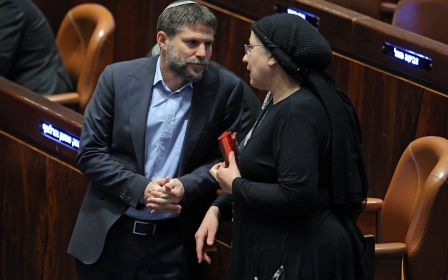Israel: New government 'won't join' Istanbul Convention against gender-based violence

Israel's incoming coalition government has decided that the state would avoid signing on to the Istanbul Convention, an international human rights treaty aimed at combating violence against women, according to a report released on Sunday by Walla news.
Israeli politicians had previously campaigned to join the 2011 treaty, but the new government is now worried about the agreement's clause that provides political asylum to victims of domestic violence.
Bezalel Smotrich, leader of the far-right Religious Zionist party, demanded that the Likud party concedes to stay out of the convention over concerns of immigration implications.
The Istanbul Convention, signed by 45 countries and the European Union, aims to protect women from violence by forcing governments to adopt legislation that would prosecute abusers, marital rape and female genital mutilation.
Turkey, the first country to ratify the convention, was also the first to withdraw from it last year, claiming it was "hijacked by a group of people attempting to normalise homosexuality" which the Turkish presidency said was "incompatible" with the country's social and family values.
New MEE newsletter: Jerusalem Dispatch
Sign up to get the latest insights and analysis on Israel-Palestine, alongside Turkey Unpacked and other MEE newsletters
A string of controversial deals
This decision is the latest in a series of deals coming out of Israel's new coalition government in the past weeks.
Others include instating the death penalty for terrorists, annexing the occupied West Bank, facilitating gender-segregated events and LGBT discrimination and immigration rights.
The incoming government also wants to give parliamentarians the right to overrule Supreme Court decisions, as well as to introduce legal reforms that could end incoming Prime Minister Benjamin Netanyahu's ongoing trial on charges of corruption - which he denies.
Orit Strock, a lawmaker from the Religious Zionist party, also said on Sunday that doctors shouldn't be required to treat patients when it contradicts their religious beliefs. Politicians from the outgoing government denounced Strock's comments.
Outgoing Prime Minister Yair Lapid condemned his successor, Netanyahu, for "leading us towards a dark, halakhic [religious law] country".
Netanyahu has denied that the coalition government would introduce such a law.
"MK Orit Strock's words are unacceptable to me and my colleagues in Likud," Netanyahu said in a statement.
Netanyahu had announced late on Wednesday that he formed a new government, minutes before a midnight deadline set by President Isaac Herzog.
Israel's longest-serving prime minister will return to power after his Likud party, far-right religious Zionist factions and ultra-Orthodox parties secured 64 of the parliament's 120 seats in what will be Israel's most right-wing administration in history.
Smotrich and Itamar Ben-Gvir, leaders of the Religious Zionism political alliance, will take up prominent positions in the new government.
Smotrich, a self-declared homophobe and settler activist, will be named finance minister and will also be placed within Israel's defence ministry, with oversight of settlements inside the illegally occupied West Bank.
Ben-Gvir, who was previously convicted in Israel of incitement to racism and supporting a terrorist organisation, will be named national security minister, with oversight of police and the force that controls security at al-Aqsa Mosque.
Middle East Eye delivers independent and unrivalled coverage and analysis of the Middle East, North Africa and beyond. To learn more about republishing this content and the associated fees, please fill out this form. More about MEE can be found here.





